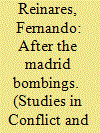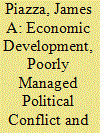|
|
|
Sort Order |
|
|
|
Items / Page
|
|
|
|
|
|
|
| Srl | Item |
| 1 |
ID:
088745


|
|
|
|
|
| Publication |
2009.
|
| Summary/Abstract |
Approaching the Madrid train bombings of 11 March 2004 from a security perspective, the occurrence of these highly lethal blasts made it evident not only a major intelligence failure, but also serious problems in the coordination between law enforcement agencies and deficiencies in international cooperation to prevent such deadly manifestations of global terrorism. As a result, governmental measures adopted in Spain immediately afterwards to reform the internal security structures and thus more adequately face the persisting risks and threats associated with that phenomenon, paid particular attention to increasing intelligence capabilities, advancing antiterrorist coordination and strengthening collaboration with relevant nations, alongside other initiatives aimed at preventing and countering al-Qaeda related terrorist activities. Overall, those measures enjoyed a high degree of legitimation among citizens
|
|
|
|
|
|
|
|
|
|
|
|
|
|
|
|
| 2 |
ID:
088750


|
|
|
|
|
| Publication |
2009.
|
| Summary/Abstract |
Terrorism is frequently argued to be the product of poverty and poor levels of economic development in countries. Examining the distribution of terrorist attacks and casualties due to terrorism across the states of India, this article demonstrates that the phenomenon of terrorism is not a clear product of poor economic development but rather exacerbated by unresolved and poorly managed political conflict. Poorer states in India are not necessarily more prone to terrorism, but states that have outstanding and poorly addressed political disputes do experience a disproportionately high level of terrorist activity. This study examines six sources of political conflict that contribute to terrorism in India-separatist movements, ethnic conflict, communal conflict, the presence of scheduled castes and tribes, high population growth, and the phenomenon of stateless areas-and makes several observations on the successes and failures of Indian counterterrorism policy
|
|
|
|
|
|
|
|
|
|
|
|
|
|
|
|
| 3 |
ID:
088752


|
|
|
|
|
| Publication |
2009.
|
| Summary/Abstract |
In February 1996, the Communist Party of Nepal-Maoist (CPN-M) initiated a bloody war to establish a Mao-style "people's republic." A decade later, however, they signed a peace agreement with the government, joined the mainstream political parties in parliament and in an interim government, and participated in democratic elections. This article provides some insight into the Nepalese Maoists's strategic and ideological thinking. More specifically, this article shows the reason behind the party's change of tactics and goals and describes the process in which these changes materialized.
|
|
|
|
|
|
|
|
|
|
|
|
|
|
|
|
| 4 |
ID:
088747


|
|
|
|
|
| Publication |
2009.
|
| Summary/Abstract |
Western intelligence analysts fight an uphill battle to avoid parochial habits of thought that lump diverse Islamist identities together. The recent counterterrorism literature gives us tools for understanding a wide spectrum of Islamists, by focusing attention on what they say about themselves rather than on the intelligence labels we must ultimately assign to them. The main challenge for analysts is not the brute diversity of Islamist types, but their plasticity-the Islamist's flexible inhabitation of distinct, sometimes contradictory, identities. Contrary to generalizations about the duplicity of all Islamists, much plasticity is due to ordinary psychological- or ideological strain-the inability to resolve divided allegiances or sustain conflicted principles. Islamist preacher Yussef al-Qardawi and salafist group Hizb ut-Tahrir present prime examples of ordinary Islamist plasticity. In order to understand Islamism in all its complexity, analysts should develop methods for disaggregating and evaluating key components of the Islamist persona.
|
|
|
|
|
|
|
|
|
|
|
|
|
|
|
|
| 5 |
ID:
088753


|
|
|
|
|
| Publication |
2009.
|
| Summary/Abstract |
This article examines how the Republic of Cyprus has confronted the threat of international terrorism. Although the threat of terrorism in Cyprus remains relatively low, the Cypriot authorities have nevertheless sought to minimize the risk and maximize the level of preparedness. This has involved taking an uncompromising attitude toward those suspected of involvement with terrorist groups. At the same time, there has been a marked increase in the amount of international co-operation, especially since EU accession, in 2004. Nevertheless, shortcomings remain, particularly in terms of the legislative framework and the development of an analytical counterterrorism capability.
|
|
|
|
|
|
|
|
|
|
|
|
|
|
|
|
|
|
|
|
|